Riding Poverty: The Last Generation of Rickshaw Pullers in Champaran
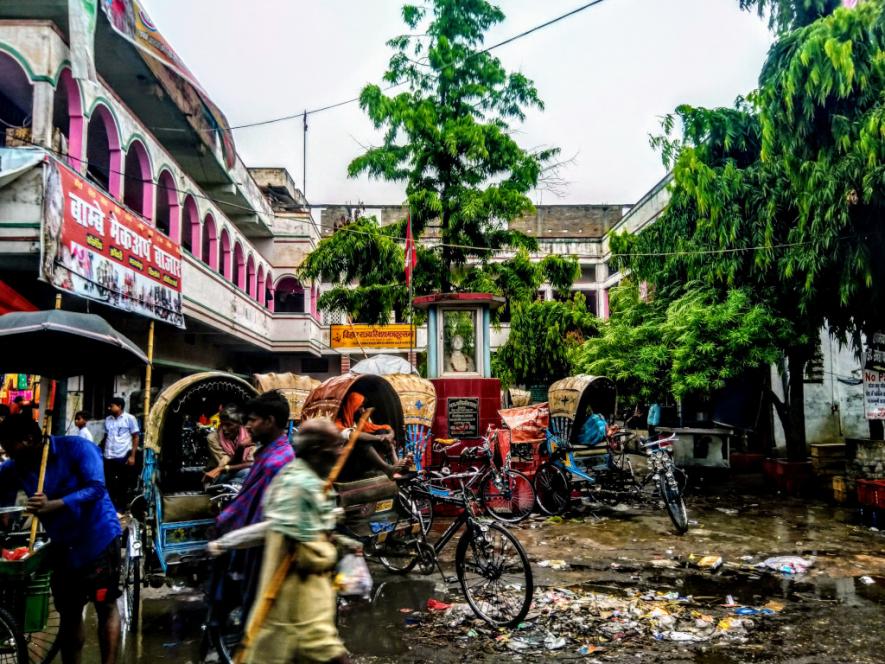
Rickshaw Stand and Union’s building, Champaran. (Images Courtesy: Ujjawal Krishnam)
In Bettiah, the district centre of Paschim Champaran in Bihar, the technological transition is easily evident. The traditional cycle rickshaws have been now overpowered by autorickshaws and e-rickshaws. This has left the last generation of rickshaw pullers in tatters.
One of them is Rammohan Mahto, 55, from Bahuarwa village. Mahto has been pulling rickshaw since he was 20. He earns a maximum of Rs. 250 per day to feed the family of nine with a supportive income from his son who earns Rs. 10,000 per month by doing manual labour in Delhi and Punjab.
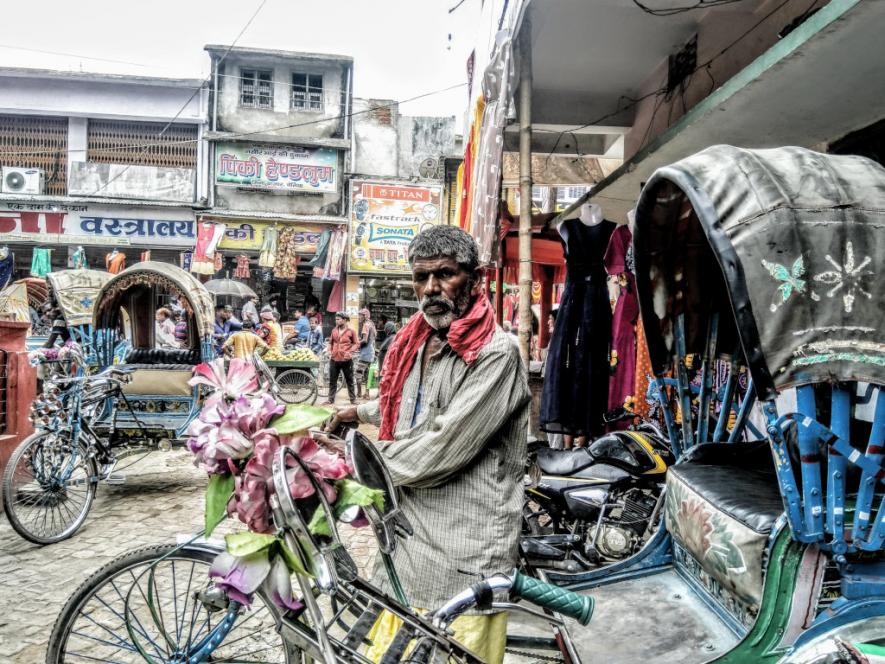
Rammohan Mahto has no option except to pull rickshaw.
“Before this age of tempo (autorickshaws and electric rickshaws) dawned here, I could earn up to Rs 500. Those days are gone. Reksha chalawal jala, bal bachwan ke khilawan jala. (Rickshaw is the only source of my income.)”, says Mahto, who is landless, has a debt of Rs. 50,000 debt which he has to pay with a monthly interest of 5%. Asked about the debt, Mahto tells us that he borrowed it as he had to give the dowry of an equal amount.
Govardhan Yadav, 65, a resident of Sant Sarian is the only rickshaw driver among some 30 of them present in the stand who is not landless. He has four katha [~2,880 sq. feet] of agricultural land. This Kharif season, he had seeded rice in the field but the crop, he says, was severely affected by drought. “I have to feed five people at home. It is all on my shoulders. God knows how it will go on,” he wonders.
Govardhan had bought a rickshaw priced at Rs 800 some two decades ago but he couldn’t retain it for long. “I bought it with the borrowed money. It was also not profitable to travel up-and-down with rickshaw from village,” Yadav adds.
“Dekhin, pahile hamnike [in 2005] inha Soha Babu Chowk se station jaeke 20 rupiya milat rahe…abhi 30 milela…okara lekha jokha me mahangayi chawguna badh gael ba (See, earlier we used to earn Rs. 20 on a trip from Sowa Babu Chowk to the railway station [for a distance of three kilometres] but we only had an increment of Rs 10 in these years compared with inflation, which has shot up to four times relative to our pay.)”
Yadav tells us that his youngest son is pursuing Master of Arts (M.A.) in a town college. He says, “Each job vacancy form costs more than Rs. 500. I don’t want to disturb him in his studies…I don’t want my son to suffer like me. Education is the only key to break this chain of poverty.”
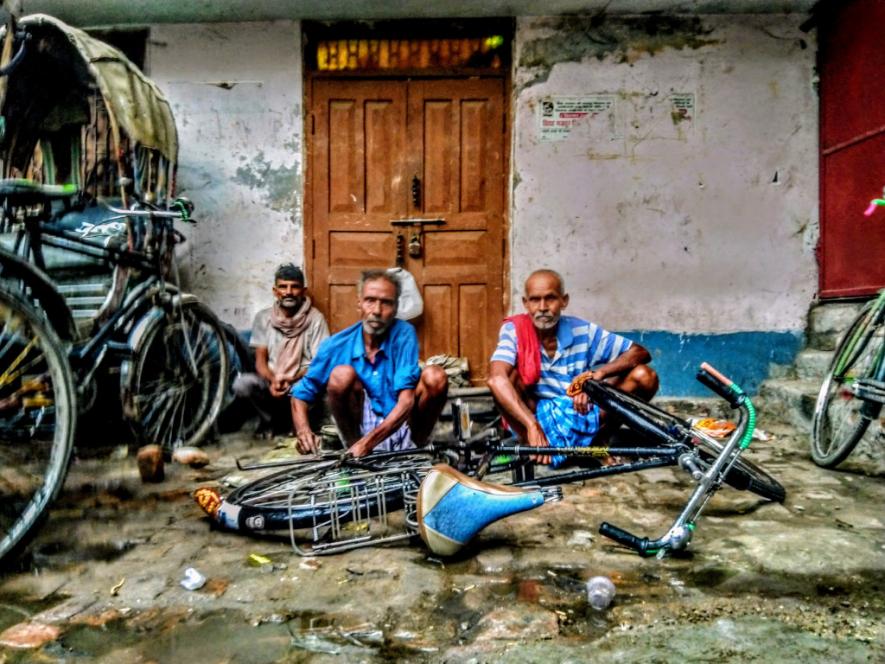
Ash Mohammed [left] is waiting for his pension; Govardhan Yadav [right] has lost crop due to drought.
Ash Mohammed, 62, is repairing a cycle at his stall next to the rickshaw stand. He was earlier into rickshaw pulling but switched to repairing business because of his old age. As we talk, showers greet us. Mohammed drags the jute sack under the shade to ensure that his upholstered seat-cum-daytime bed doesn’t get drenched. He says, “I am now old and vulnerable. I had submitted pleas in the collectorate but haven’t received any update on pension yet. I have nothing except a small house in Ganj Number 2 basti.”
There are also some middle-aged men waiting for the ride at the rickshaw stand.
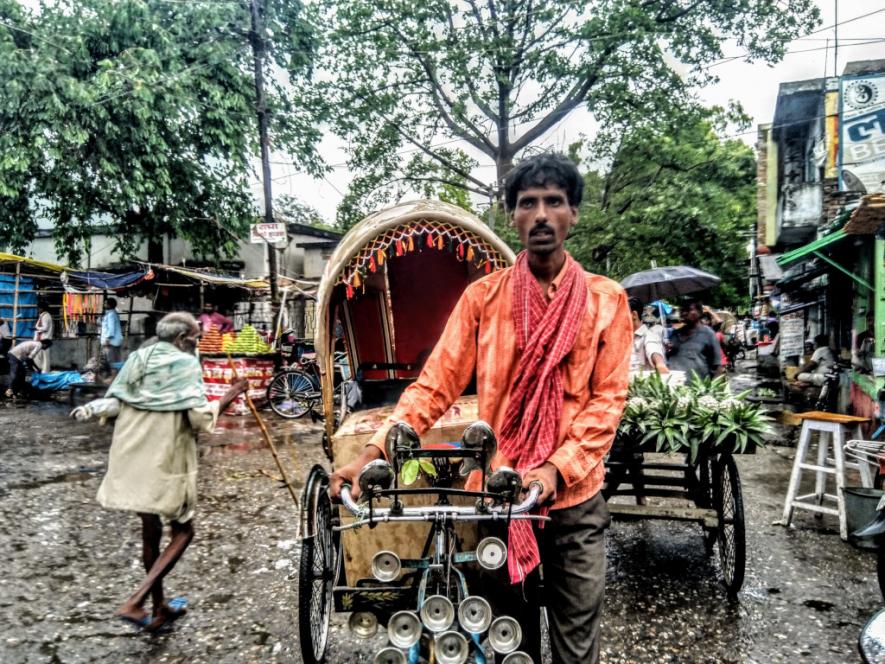
Lakshman Prasad dreams of having his own ricksaw someday.
Lakshman Prasad, 35, hails from Sanichari village, which is 50 kilometers away from the district centre. Like most of the others, he borrows a rickshaw from Meena Bazar on a rent of Rs. 50 per day. Whatever is left apart from the household expenditure at the end of the day, he saves to pay the fees of his children who are in primary school.
“I want to educate my children. Will I be able to sustain this basic need of my kids?”, he says, adding “If I become financially stable, I will think of buying my own rickshaw one day. But that will be a risk as cycle rickshaws are going to be completely replaced by electric rickshaws in some years”.
Pramod Paswan, 37, has learnt to drive autorickshaws. He also has a license but he can’t afford it as the rental charge for an autorickshaw is capped at a minimum of Rs. 350 and that bears critical chances of loss. Paswan, who has been driving a rickshaw since 2003, lost his son because of medical negligence in the local government hospital [MJK Hospital]. He says “It was an emergency condition but doctor delayed the delivery. I lost my child.”
Interrupting the conversation, Mohammed Samsul, 35, says, “People were displaced so that this government medical college could be established on their ruins and people educated there [by becoming private doctors] can feed on the blood of poor and let them suffer in government hospitals.”
Samsul was evicted from the slum which was later demolished by the Bettiah Municipality to build the medical school. He is now forced to pull a rickshaw. No concession, Samsul says, was paid by the government. He now lives in a rented room which costs Rs. 3,000 per month. He further says, “Contractors of the municipality earlier used to overcharge people for the mandatory cycle and rickshaw tickets. A cycle ticked was priced at Rs 50 and rickshaw ticket at Rs 70. This led to several scuffles between rickshaw pullers and the contractor’s men. After protested against this injustice, the ticket system has been abolished for now.”
Samsul’s teenaged son, Raja, drives tonga (horse cart) in free time to support the family needs.
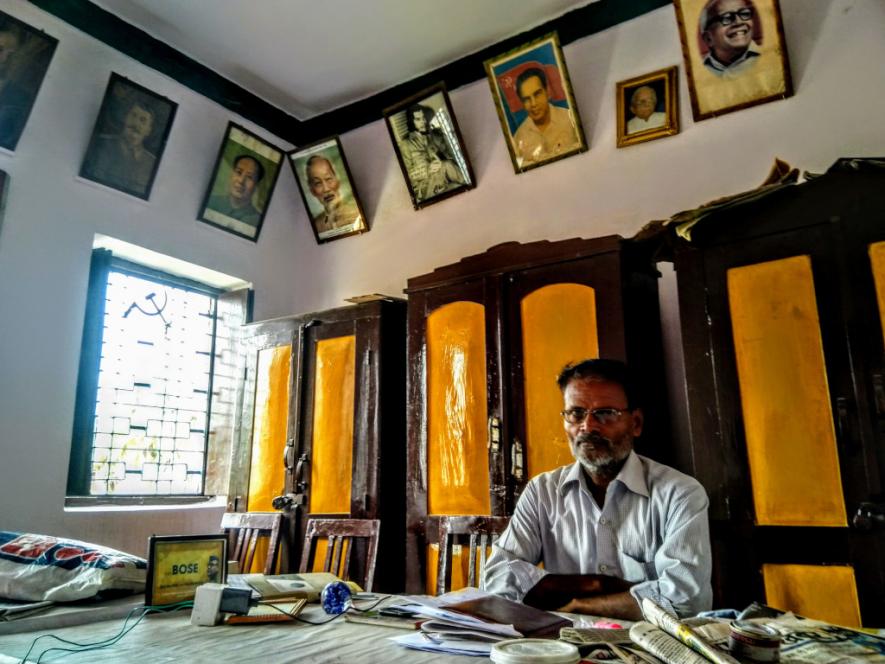
Shankar Rao, General Secretary of Bihar Rajya Rickshaw Majdoor Sabha
Confirming the dwindling number of rickshaw-pullers in the area, Shankar Kumar Rao, General Secretary of Bihar Rajya Rickshaw Majdoor Sabha (an affiliate of Centre of Indian Trade Unions) says, “In 2010, we had more than 700 registered rickshaw pullers. The number has come down to 462 at present. The transition of youth towards auto rickshaws and electric rickshaws is the reason behind this. Most of rickshaw pullers today are the old men. They have done it for decades and now it is difficult for many of them to adjust to technical advancement.”
Rao says the Majdoor Sabha is working towards availing a minimum social security cover for rickshaw pullers. “The union provides financial support between Rs 30,000 and Rs 1 lakh in case of accidents and deaths on road,” he says, adding “the union is demanding complete medical cover for rickshaw pullers and pension of Rs. 3,000 for those who crossed 60 years of age. But this remains a dream.”
Rao laments that every government “is for the capitalist. Who listens to the labourers?”
As this reporter prepares to leave the Majdoor Sabha’s office, a slogan printed with the portrait of Karl Marx hanging from the wall catches his attention.
“Workers of the world, unite!”
The writer is an independent journalist and serves as an editor at Academia.edu. He writes on social inequality and rights in India.
Get the latest reports & analysis with people's perspective on Protests, movements & deep analytical videos, discussions of the current affairs in your Telegram app. Subscribe to NewsClick's Telegram channel & get Real-Time updates on stories, as they get published on our website.
























